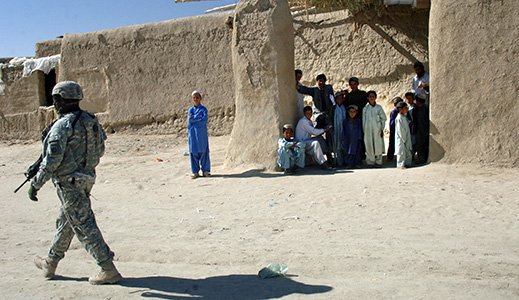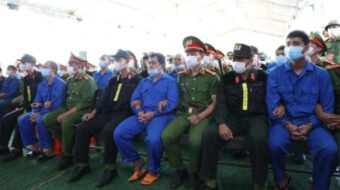
In President Obama’s remarks yesterday, presenting the results of his review of U.S. Afghanistan policy, he argued that progress is being made there, including training of Afghan security forces, but the progress is still “fragile and reversible.” He noted that “much of this progress … is the result of us having sent a clear signal that we will begin the transition of responsibility to Afghans and start reducing American forces next July.”
His pledge last year to start pulling U.S. troops out in July 2011, he said, provided a “sense of urgency” that helped “galvanize” a move toward “a new phase in Afghanistan, a transition to full Afghan lead for security that will begin early next year and will conclude in 2014” when U.S. troop withdrawal would be completed. (NATO, he said, would maintain “a long-term commitment to training and advising Afghan forces.”)
The president was walking a fine line.
Some of his critics emphasize how grim the conditions are in Afghanistan. However that argument can be used to press for an extended and perhaps bigger U.S. military role. If the White House wants to begin getting out of Afghanistan, it has to point to some progress on stability and self-governance there.
At the same time, given the toxic political, economic and social mix on the ground in Afghanistan, it is entirely possible that a rapid U.S. pullout in 2011 and 2012 might be followed by scenes of chaos and violence that could feed the warhawk Republican presidential campaign.
With that in mind, it may be that Obama is intent on beginning the withdrawal process next July, but wants to maintain a substantial military presence in Afghanistan through the 2012 election period.
If a Republican takes over the White House in 2012, one can expect a return to aggressive Bush-Cheney militarism but perhaps on steroids this time. U.S. peace advocates will have to walk their own fine line, broadening the movement to end the war while keeping their fire focused on the Republicans.
In his remarks yesterday, Obama said the U.S. military mission in Afghanistan is solely to defeat and disrupt al-Qaeda. The core goal, he said, is “not to defeat every last threat to the security of Afghanistan, because, ultimately, it is Afghans who must secure their country. And it’s not nation-building, because it is Afghans who must build their nation. Rather, we are focused on disrupting, dismantling and defeating al-Qaeda in Afghanistan and Pakistan, and preventing its capacity to threaten America and our allies in the future.”
That effort, according to administration officials cited by the New York Times, will include stepped up drone attacks on suspected terrorists in Pakistan’s tribal regions bordering Afghanistan.
Yet all indications are that al-Qaeda has become a convenient label that multiple terrorist groups may be using to achieve varied goals in other parts of the greater Middle East, Asia and elsewhere. Yemen in particular is reportedly now a key base for a group known as “al-Qaeda in the Arabian Peninsula.” That group is considered responsible for hatching terrorist plots that reach as far as the U.S. In Iraq, a group known as “al-Qaeda in Mesopotamia” has been operating for several years, with many believing it is at least in part a front group for Saddam Hussein supporters.
It is possible that Afghanistan with all its chaos and lucrative drug traffic now provides a training and funding base for these other organizations. But it seems clear that these shadowy groups have other resources. It is hard to see how the U.S. killing reputed al-Qaeda leaders in Afghanistan or Pakistan will eliminate the hydra-headed “al-Qaeda” and the terrorist threats that the world community is grappling with.
Although some of Obama’s remarks seemed to conflate the Taliban and al-Qaeda, he backed negotiations with some Taliban elements. The U.S., he said, will “fully support an Afghan political process that includes reconciliation with those Taliban who break ties with al Qaeda, renounce violence and accept the Afghan constitution.”
Obama also acknowledged that for security and stability to be sustainable in Afghanistan, “there is an urgent need for political and economic progress.” He said there has been a “dramatic increase” in U.S. civilian personnel working on development there over the past year and said the coming year would focus on basic services. Yet many warn that these civilian efforts cannot succeed as long as they are linked to the U.S. military presence.
In a new ABC News/Washington Post poll conducted Dec. 9-12, a record 60 percent said that given the costs versus the benefits, the war in Afghanistan has not been worth fighting. That is a 7-point jump since July.
At the same time, another ABC survey showed the public about evenly divided on Obama’s handling of the war – 45 percent supporting and 46 percent opposing. Fifty-four percent supported his plan to start withdrawing troops next July – up by 15 points since it was announced a year ago. Twenty-seven percent said the withdrawal should begin sooner, and 12 percent said it should start later, down 7 points from a year ago.
Photo: U.S. Army

MOST POPULAR TODAY


Zionist organizations leading campaign to stop ceasefire resolutions in D.C. area

Communist Karol Cariola elected president of Chile’s legislature

High Court essentially bans demonstrations, freedom of assembly in Deep South

Afghanistan’s socialist years: The promising future killed off by U.S. imperialism






Comments